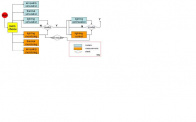Lighting controls systems in buildings
The use of lighting control systems could represent an effective solution to reduce the electric lighting energy requirements in buildings, while preserving the functionality and environmental quality of spaces. Lighting control technologies are available since a long time, but concerns about their reliability, economical convenience and acceptability still subsist.
The research activity on the topic of lighting control is carried out considering different points of view: effectiveness of different control strategies in buildings with different architectural features and type of activities, analysis of existing lighting control technologies in the perspective of new potential developments, analysis of conventional control solutions and development of innovative control architectures.
Another important research topic concerns the integration of lighting control solutions with more comprehensive ICT based building management systems designed to improve the overall building energy efficiency. In particular the potential improvement for lighting control obtainable through the use of wireless, energy efficient and/or battery free sensors networks for monitoring and control actuation is considered.
The research program is meant to contribute to carry out studies on lighting control technologies with the aim to evaluate obtainable energy savings and visual comfort. Within of a research contract entitled “Models and Technologies for the integration of Daylighting and Electric Lighting” with ENEA (CERSE), were produced guidelines on lighting control systems and evaluation models related evaluation models.
Furthermore, within an European project funded under the VIIPQ for research and technological development (FP7-2010-NMP-ENV-ENERGY-ICT-EeB; CALL: ICT for energy efficient buildings and spaces of public use), entitled “Smart Energy Efficient Middleware for Public Spaces (SEEMPubs)”, where the Energy Department of the Politecnico di Torino is a partner, are currently underway experimental analysis in field for buildings with different ages of construction, and different lighting and HVAC systems. This experimental activity includes the use of an intelligent ICT-based service to monitor and control environmental conditions, energy loads and plants operation.

People
- CHIARA AGHEMO
- VALERIO ROBERTO MARIA LO VERSO
- ANNA PELLEGRINO
